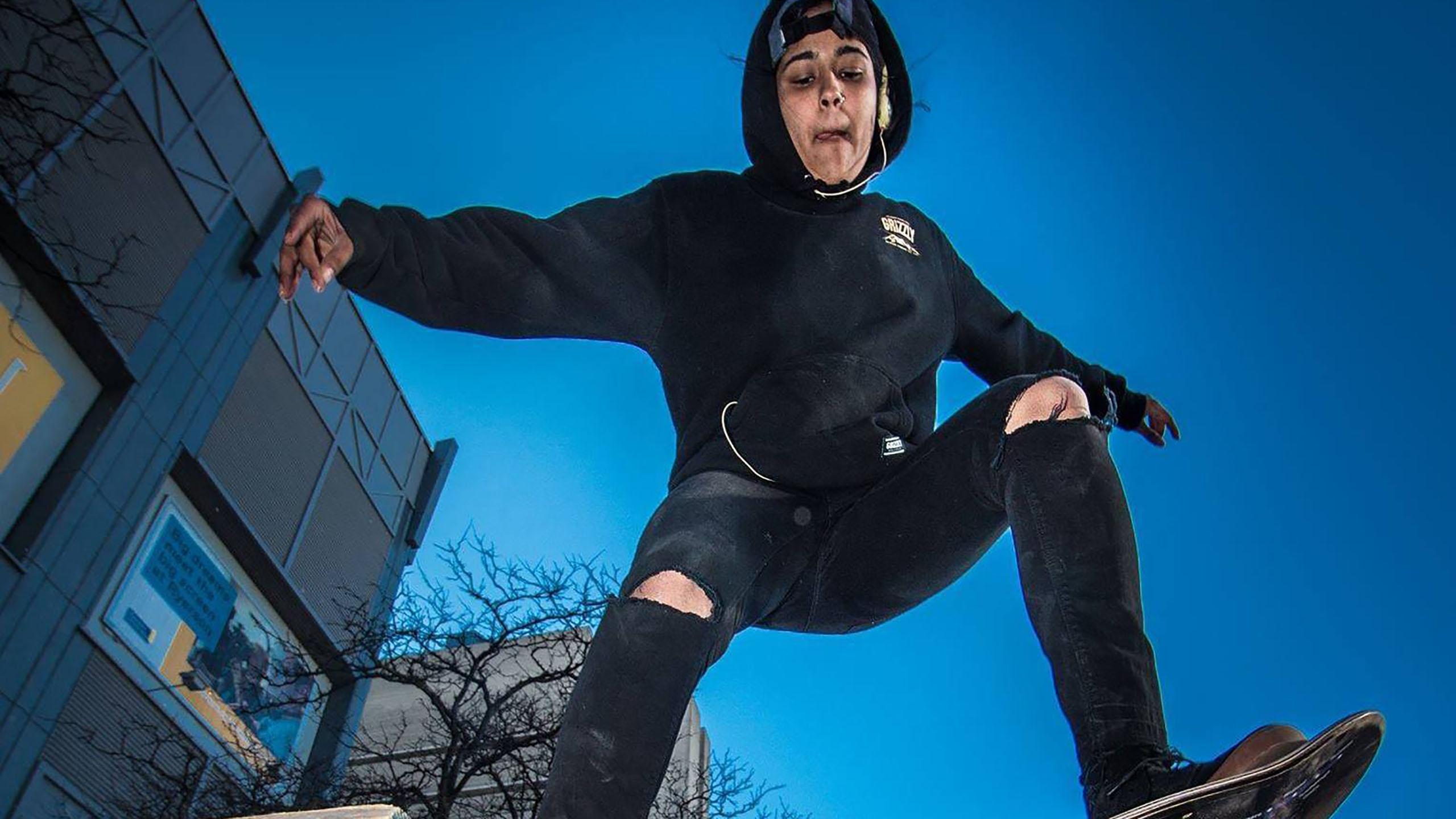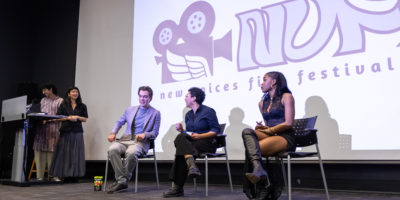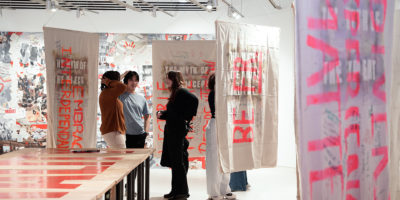By Nabeeha Baig
Ryerson’s Lake Devo is famous for skateboarders flexing their tricks and freely riding without disruption. What’s usually an ice rink in the winter months turns into an open space where skaters can ollie onto the curb, grind along the edge of the concrete or cruise back and forth on Victoria Street right beside it. More often than not, though, these spaces are dominated by men.
It’s not that women and non-binary folks don’t skateboard. Rather, the spaces are difficult to be in: A sport known for its physically demanding nature, women and non-binary skaters often feel pressured to prove themselves to male skaters in order to gain access to the skateboarding community, according to third-year Ryerson fashion student Cynthia Johnman.
Originally from Hamilton, Ont., Johnman was always captivated seeing people skateboarding around her town, but also wary of the misogynistic and homophobic language she would often hear them spew. Although the comments were not directed at her, hearing male skaters in their 30s using “gay” as a slur or ridiculing the idea of “not assuming people’s gender” added even more anxiety to her already shaky start.
In one of her first trips to her local skate park, not only did Johnman have a tense run-in with an ex but she also overheard the usual obnoxious, homophobic remarks from other men. As part of the LGBTQ2+ community, the discomfort she felt was too much for her to take, so she called her mother to pick her up.
“A lot of dudes don’t realize the way that they take up space—they feel like it’s warranted just because it’s a male-dominated activity and sport”
Johnman admits that it also took her awhile to get over the feeling of intimidation at skate parks or on campus where she was one of the few, if not the only, girl there. She knew there was a trope about women only wanting to skate for the aesthetic, “to look cool,” or to seem different for liking something that isn’t particularly “feminine.” On top of this, she’s seen firsthand the subtle judgment that is passed on to skaters with less experience—especially if they are marginalized.
Whether it be through extensive skill, knowledge or toughness, some women have to fight for their right to skate freely and without judgement. In a document released by the City of Toronto where youth skateboarders were consulted on skatepark planning, many female respondents and newcomers to the sport reported that they felt “intimidated and unwelcome in skateparks,” with the biggest barrier being “breaking the ice” and overcoming the initial fear of approaching skateparks.
The highly male dominated industry is made up of 23.9 per cent female skateboarders, according to the Public Skatepark Development Guide, a resource advocating for public skatepark projects in the United States.
For Ryerson women and non-binary folks, navigating the male-dominated space can be intimidating. But through solidarity, community-building and power in numbers, skaters are paving the way for a future where the sport is free of discrimination and barriers for marginalized individuals.
Leanne Solinap, a first-year disability studies student, says the skating community at Ryerson was part of the reason she became serious about the sport. After going on a campus tour in October 2018, Solinap remembers passing by Victoria Street watching the skaters in awe. Prior to this encounter she only dabbled in the sport, but after an inspiring conversation with one of the skaters at Lake Devo, she began practicing regularly and trying to teach herself tricks. The kind stranger had given her words of encouragement, assured her not to worry about judgement from others, and told her she should “go for it.”
At first, Solinap was terrified to skate on campus alone because she would only see another girl there “once in a blue moon.” But those few times that she did, she would go up to them and start a conversation or ask for their help if she saw a cool trick that they were doing. She says that while it can be intimidating to skate at first, people at Ryerson are for the most part “really chill and willing to help if you show that you have a genuine interest in the sport.”
Eventually, Solinap found community in the space—the friends she had made introduced her to their other friends, and before she knew it, she had found her people.
However, the space doesn’t feel welcoming for everyone, like third-year English major Lisa James*. James has a long history with skating but only began taking it seriously in their late teenage years. After face-planting off a hill and chipping their front tooth at eight-years-old, James took a long break from the sport until they were 17. At that point, they spent an entire summer practicing tricks by themself and skating “everywhere, everyday.”
They always felt like they had a very weak body, so when James went back to skating, not only was it for exercise but also to feel physically stronger. “The way that you can interact with the pavement, the kicking, the pushing and kind of just, ‘carrying yourself’ is a really gratifying feeling,” they said. “I also like the fact that there are tricks, so when you learn something and you stick it, it’s like muscle memory—when you’re doing something so much it feels natural, it feels like breathing.”
“I’m always afraid someone’s going to be looking at me weird or even worse, one of those guys coming up to me and trying to teach me something”
Prior to the campus construction on Gould and Victoria streets, James would often skate by Lake Devo in the summer time with their femme friends, but avoided skating there throughout the school year when they knew a lot more people would be there. “I’m sure there are a lot more femme skaters [on campus], but it’s just not a comfortable space for them,” they said. If they aren’t accompanied by their femme friends or “guys that [they] find decent,” James would not skate there alone. “I’m always afraid someone’s going to be looking at me weird or even worse, one of those guys coming up to me and trying to teach me something.”
On several occasions, they have had men come up to them and attempt to teach them something, to which James either replies with a confused look, or by simply walking away. “It’s always so corny,” they said. “A lot of dudes don’t realize the way that they take up space—they feel like it’s warranted just because it’s a male-dominated activity and sport.”
Along with Lake Devo being overwhelmingly male, James says that the skateboarding community is also very white-centred. White femmes have a completely different experience in skate culture than James in terms of taking up space and being given more attention. “Of course, there are times when I don’t give a fuck and we would all be having fun, but there’s always something in the back of my head saying, ‘If these people are skating, maybe I should just sit to the side,’ and that’s bullshit,” they said.
Being queer-identifying, Black and Indigenous, James often feels like they have to fight for all their intersections in many other aspects of their life, so they usually don’t vocalize the inequality in their skateboarding life. “It’s something I’ve wanted to talk about for a minute, but I could never place it,” they said. “I would always think about why I’m being so sensitive to these environments that I’m putting myself in, but it makes sense and it’s valid; I’m not just being a baby.”
Twenty four-year-old Ryerson alumni Parm Kaur would like to see more connections between different groups in the skating community. “I know it’s hard because you want there to be a safe space for women and non-binary people, but I think it would be cool to see guys and girls and non-binary people, or whoever, come together so [the community] is not as segregated,” she said.
Kaur, who grew up in Orillia, Ont., did not see a lot of representation for herself at local skate parks. Instead, she found inspiration through professional X Games skater Leo Baker. She remembers watching Baker’s interviews talking about their experiences with sponsorships and how they often had to conform to the femininity that their sponsors were pushing for. Seeing Baker’s journey unfold gave Kaur some of the representation that she was deprived of— although they are not the “norm” in skate culture (being a queer, gender non-conforming individual) they are just as skilled and continued to get recognition and sponsorships from Nike SB, Meow Skateboards, Pawn Shop Skate, and Bones, even after ditching the feminine aesthetic pressured on them earlier in their career.
During her second year at Ryerson, Kaur started to look for other women to skate with alongside her. She would skate around campus in between classes and go to Lake Devo almost everyday, but still did not find a solid group of people to skate with. After Googling “Toronto girls skateboard group,” she stumbled upon a women’s skateboarding brand and group called Babes Brigade. After seeing the group promote a meet and greet event at Skate Loft, an indoor skate park in Toronto, Kaur was intrigued. Despite her hesitance about putting herself out there, she decided to check it out and met a bunch of welcoming women who still remain her close friends to this day.
“That is my definition of equality—an equal amount of men and women working in that industry”
The group was founded by 33-year-old Stephanie Battieste in July 2015, originally as a Facebook group to encourage women to skateboard by offering them a safe space surrounded by like-minded individuals.
“I think that women like me, from all over the world, have taken it upon ourselves to show the community that there are many women out there who skate, and some of them are even better than the guys,” Battieste said.
Battieste says she wants Babes Brigade to be one of the first successful skateboarding companies owned by a woman. “Most skateboarding companies are owned by Caucasian men and being a mixed-race female who owns a successful skate company, I believe [it] would inspire more women to do the same,” she said. “That is my definition of equality—an equal amount of men and women working in that industry.”
For girls and women who are apprehensive to skate, Battieste says that confidence is everything and fear will only hold you back. “It is important that people don’t allow stereotypes or misconceptions to depict what they do…be confident and do what you want.”
Now, Johnman is more confident, and when she goes to skateparks alone she says she feels like she doesn’t “owe anything to anybody.” After going various skateboarding competitions at different skate parks like Beasley Skatepark in Hamilton and Dunbat Skatepark in Toronto to observe, she eventually met a group of girls who immediately showed her love. It didn’t take long to feel welcomed, and after a competition at Dunbat Skatepark, they added Johnman to their group chat on Instagram, “Muff Grove,” quickly becoming friends with a lot of them. “Most people are going to respect you if you’re trying,” she said. “If you’re actually trying to develop your skills and learn new tricks, people will encourage you. You just have to try and not let the fear hold you back.”
Johnman’s favourite part about skateboarding is the sense of community that it brings to her life. She feels like she has finally found her subculture of people in this space, partly because she wasn’t lucky enough to find that in school. Being a gay woman, she felt like an outsider in her program which is mostly straight, whereas her skateboarding friends are mostly gay and better able to relate with her life experiences.
Joining Muff Grove significantly boosted her confidence and made her feel like she was a part of something. “We all celebrate each other’s small victories. I feel strong when I’m skating with a bunch of other girls, I don’t feel intimidated or dumb for not being good at certain things—it’s added so much love and support to my life,” Johnman said.
*Name has been changed to protect the source’s privacy and security












BD
Tbh I feel this is utter BS as a pansexual Denè man, I’ve never in 23 years seen true homophobia at a skate park. And that part about teaching. Go to an unpopulated skate park and practice if you dont want any help. We are a community. We help each other. I dont like this idea that if I offer you a tip on footing or something that it bothers you. I’ve had it happen, hell everyone has. WE ARE A COMMUNITY THAT HELPS EACH OTHER. Get over yourself